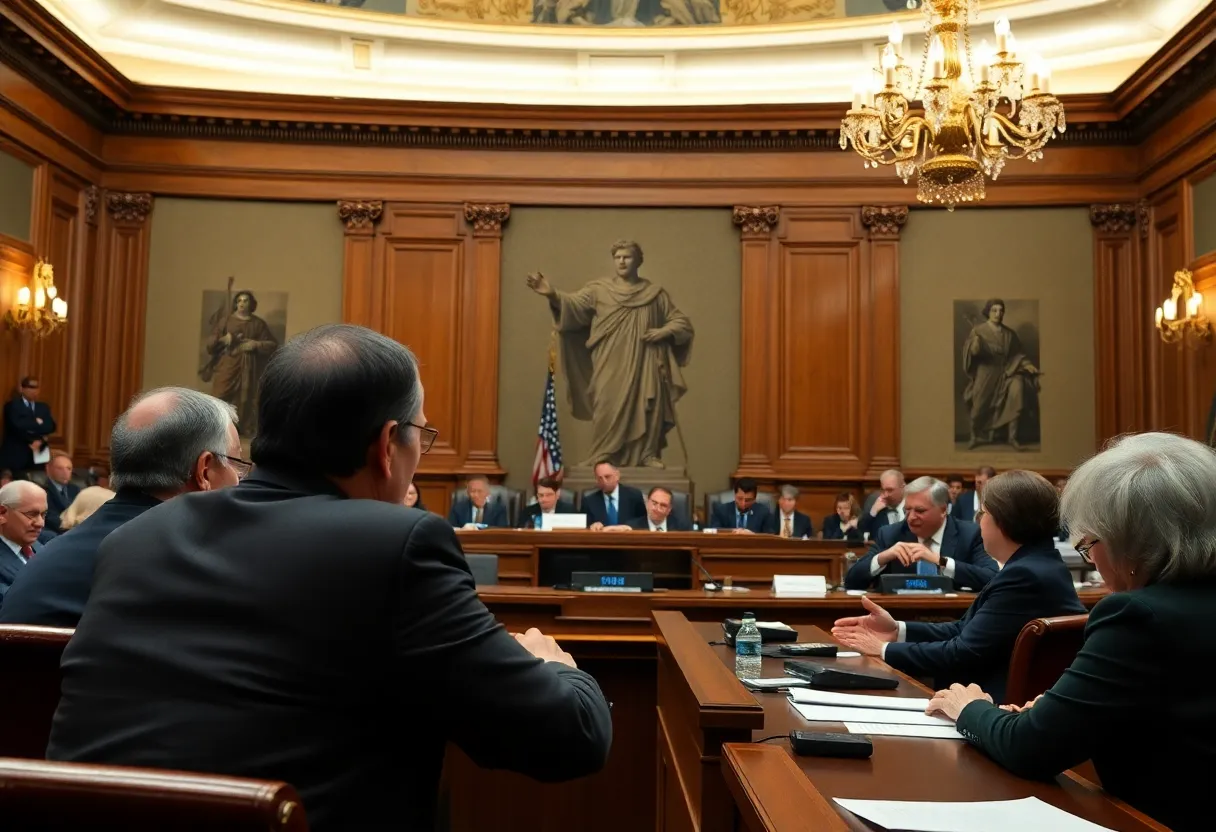Boston, October 20, 2025
News Summary
A Senate standoff over the Small Business Innovation Research (SBIR) program is risking crucial funding for small tech firms in Boston. The program expired at the end of September without renewal, with Senators Ed Markey and Joni Ernst at an impasse regarding proposed funding caps. While Ernst’s proposal seeks to limit frequent users to a ‘lifetime’ cap of $75 million, Markey advocates for a one-year extension. This deadlock could significantly impact Massachusetts startups relying on ongoing funding for research and development.
Boston — A Senate standoff over the future of the Small Business Innovation Research program is threatening funding for small tech firms after the program expired at the end of September without renewal. The deadlock centers on a dispute between Senator Ed Markey (D-MA) and Senator Joni Ernst (R-IA) over whether frequent users of the program should be excluded from future funding, and whether a proposed “lifetime” cap should be applied.
Key developments
The Small Business Innovation Research (SBIR) program, essential for small tech businesses, expired at the end of September without renewal. The House has already passed a one-year extension which awaits Senate agreement. In the Senate, the deadlock involves Senator Ed Markey (D-MA) and Senator Joni Ernst (R-IA). Senator Ernst proposes a bill that includes a “lifetime” funding cap of $75 million, which may freeze out over a dozen Massachusetts companies. Senator Markey is pushing for a one-year extension of the program to allow more time for negotiations.
What each side wants
Supporters of Senator Ernst’s bill say the measure will limit what they describe as “SBIR mills” that exploit the program for profit without creating commercially viable products. Proponents also highlight elements of the bill aimed at funding innovation for military applications and enhancing commercial revenue benchmarks.
Opponents, including Senator Markey, argue the cap would disadvantage successful companies capable of providing valuable solutions. The debate highlights a divide between modernizing the program versus maintaining its current structure, which many firms argue is critical to innovation.
State-level stakes in Massachusetts
Several Massachusetts stakeholders have expressed concern about the Ernst proposal. The cap in Ernst’s bill could freeze out over a dozen Massachusetts companies. An increasing number of Massachusetts startups (from 50 to around 70) have expressed support for Markey’s efforts to extend the SBIR program without changes. Business leaders like Rohit Gupta, CEO of Sentenai, praise elements of Ernst’s bill focused on funding innovation for military applications and enhanced commercial revenue benchmarks. Key stakeholders in Massachusetts, including Bill Marinelli from Physical Sciences Inc., argue that the proposed changes could harm companies that successfully fulfill the program’s role in developing critical technologies for the government.
Practical impacts and near-term risks
The current tensions could delay new awards, impacting companies relying on ongoing funding for research and development. There are contrasting views on the “success” of long-term program beneficiaries, with some claiming they hinder opportunities for new entrants in the market. Potential outcomes of the standoff include a permanent renewal of the SBIR program or a compromise that integrates elements from both sides of the debate.
Broader implications
The fate of the SBIR program is seen as integral to maintaining the United States’ competitive edge in technology and innovation against global competitors. Observers note that changes to program rules, funding caps, or eligibility requirements could reshape how federal research dollars support small businesses nationwide and how those companies scale commercially and support government technology needs.
Next steps
Negotiations and upcoming votes in the Senate are expected to determine whether the House-passed one-year extension is approved, whether Ernst’s proposals are adopted, or whether a different compromise emerges. Lawmakers on both sides indicate the decision-making process is ongoing and could conclude with a short-term extension, a longer-term renewal, or a new structure for SBIR participation.
FAQ
What happened to the SBIR program?
The Small Business Innovation Research (SBIR) program, essential for small tech businesses, expired at the end of September without renewal.
Who is involved in the Senate dispute?
The deadlock involves Senator Ed Markey (D-MA) and Senator Joni Ernst (R-IA).
What is Senator Ernst proposing?
Ernst proposes a bill that includes a “lifetime” funding cap of $75 million, which may freeze out over a dozen Massachusetts companies.
What do supporters of Ernst’s bill say?
Supporters of Ernst’s bill claim it will limit “SBIR mills” that exploit the program for profit without creating commercially viable products.
What does Senator Markey want?
Markey advocates for a one-year extension of the SBIR program to allow more time for negotiations.
Has the House acted?
The House has already passed a one-year extension which awaits Senate agreement.
How have Massachusetts startups responded?
An increasing number of Massachusetts startups (from 50 to around 70) have expressed support for Markey’s efforts to extend the SBIR program without changes.
Are there business leaders who support parts of Ernst’s bill?
Business leaders like Rohit Gupta, CEO of Sentenai, praise elements of Ernst’s bill focused on funding innovation for military applications and enhanced commercial revenue benchmarks.
How do Massachusetts stakeholders view the proposal?
Key stakeholders in Massachusetts, including Bill Marinelli from Physical Sciences Inc., argue that the proposed changes could harm companies that successfully fulfill the program’s role in developing critical technologies for the government.
Could the standoff delay funding?
The current tensions could delay new awards, impacting companies relying on ongoing funding for research and development.
Why does this matter nationally?
The fate of the SBIR program is seen as integral to maintaining the United States’ competitive edge in technology and innovation against global competitors.
Quick reference table
| Issue | Current status | Potential impact |
|---|---|---|
| SBIR program status | The Small Business Innovation Research (SBIR) program, essential for small tech businesses, expired at the end of September without renewal. | Possible delays to awards and research funding for small firms. |
| Senate deadlock | The deadlock involves Senator Ed Markey (D-MA) and Senator Joni Ernst (R-IA). | Senate agreement pending; outcome will shape renewal or revision of SBIR rules. |
| Ernst proposal | Ernst proposes a bill that includes a “lifetime” funding cap of $75 million, which may freeze out over a dozen Massachusetts companies. | Could limit long-term beneficiaries and change program eligibility dynamics. |
| Markey position | Markey advocates for a one-year extension of the SBIR program to allow more time for negotiations. | A one-year extension would provide time for compromise without immediate structural changes. |
| House action | The House has already passed a one-year extension which awaits Senate agreement. | Final outcome depends on Senate votes and any negotiated changes. |
Deeper Dive: News & Info About This Topic
HERE Resources
UMass Boston Receives $3.8 Million Grant for Quantum Technologies
CellCentric Expands U.S. Operations with New Boston Office
New England’s Economic and Educational Gap Widens
Boston Job Market Outlook 2025: Hiring Trends For Tech And Healthcare
Revvity Layoffs 2025: Who Was Impacted And What To Do Next
Raichelle Kallery Becomes First Female CEO of The Savings Bank
NVIDIA Invests in QuEra to Advance Quantum Computing in Boston
Welsh Businesses Offered Funded Trip to MIT Conference
Humanoid Robot Abbi Provides Companionship for Dementia Patients
PGA Tour Restructures with Future Competition Committee
Additional Resources
- Boston Globe: SBIR Program Standoff
- Wikipedia: Small Business Innovation Research
- Federal News Network: Major Changes to SBIR Program
- Google Search: SBIR program
- Robotics and Automation News: MassVentures Grant Funding
- Encyclopedia Britannica: Innovation
- Boston Globe: SBIR and Tech Startups
- Google News: Small Business
- Inc: Senator Markey on Tariffs
- Google Scholar: Small Business Innovation Research

Author: STAFF HERE BOSTON WRITER
The BOSTON STAFF WRITER represents the experienced team at HEREBoston.com, your go-to source for actionable local news and information in Boston, Suffolk County, and beyond. Specializing in "news you can use," we cover essential topics like product reviews for personal and business needs, local business directories, politics, real estate trends, neighborhood insights, and state news affecting the area—with deep expertise drawn from years of dedicated reporting and strong community input, including local press releases and business updates. We deliver top reporting on high-value events such as Boston Marathon, Head of the Charles Regatta, and Boston Harborfest. Our coverage extends to key organizations like the Greater Boston Chamber of Commerce and Associated Industries of Massachusetts, plus leading businesses in finance, biotech, and insurance that power the local economy such as Fidelity Investments, Biogen, and Liberty Mutual Insurance. As part of the broader HERE network, we provide comprehensive, credible insights into Massachusetts's dynamic landscape.





